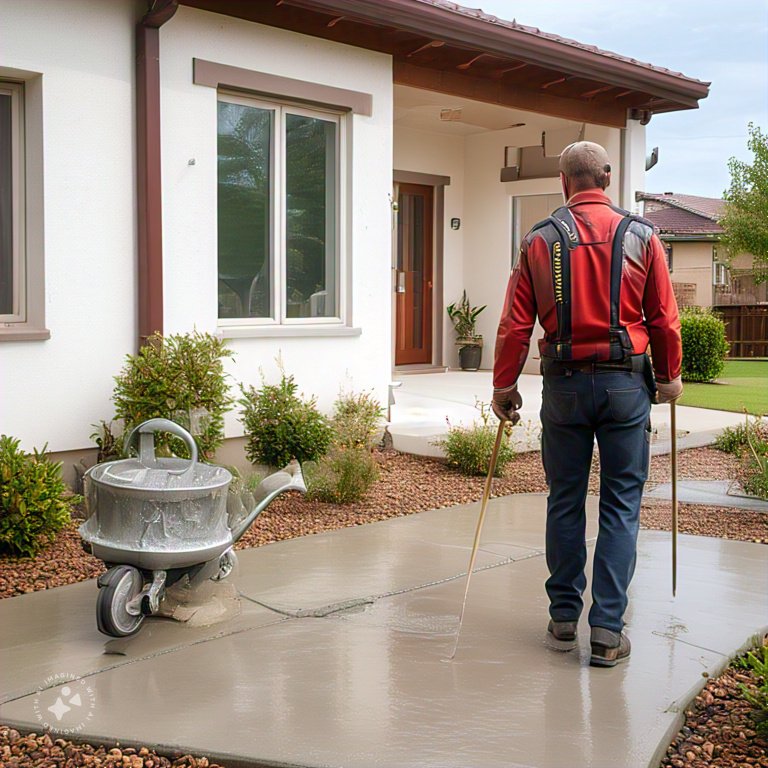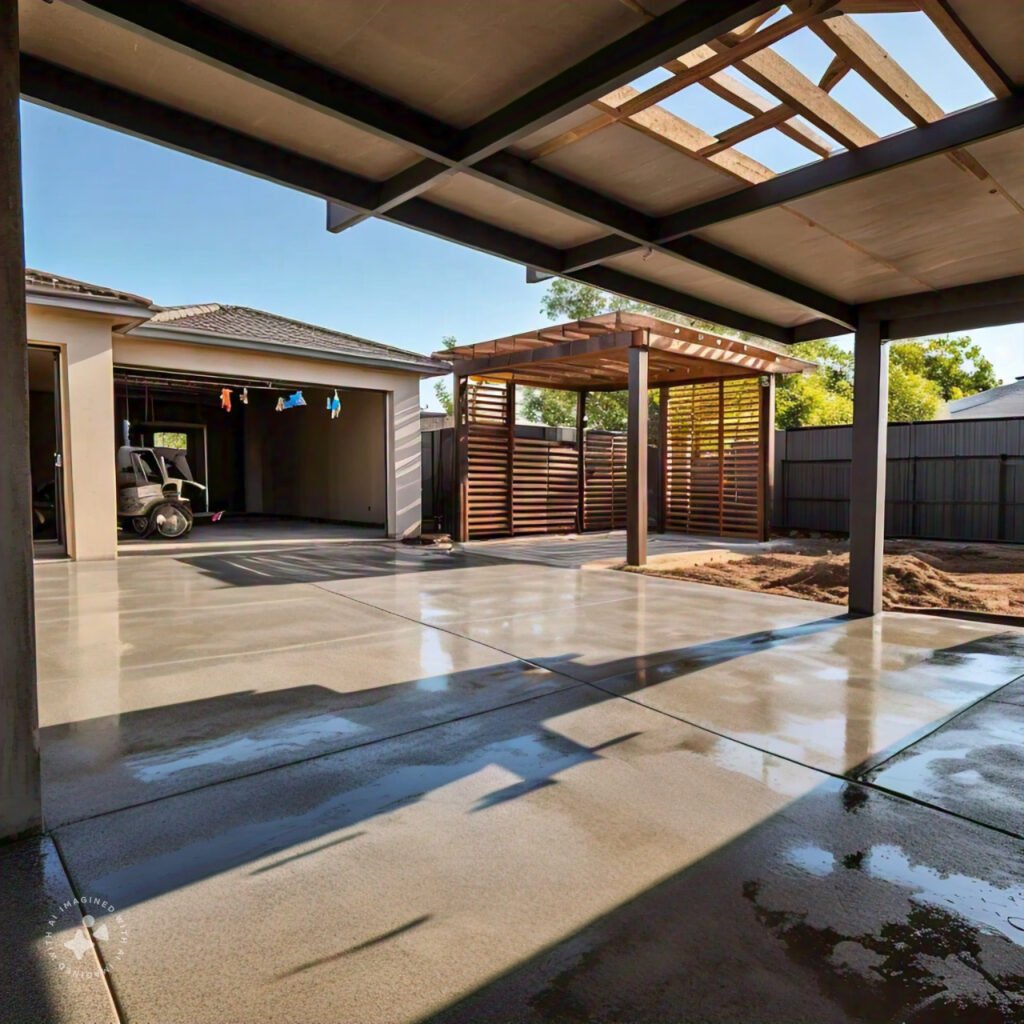Traditional cement is a significant contributor to global carbon emissions, prompting homeowners and builders to seek greener options for concrete construction. Innovative materials are not only reducing environmental impact but also enhancing performance in home foundations, driveways, and patios. These evolving alternatives offer promising characteristics, such as improved durability, reduced energy consumption, and better lifecycle performance. Understanding these substitutions is key for sustainable building practices that align with modern environmental goals.
1. Fly Ash – Recycling Waste into Concrete Strength

Fly ash, one of the most established alternatives to traditional cement, is turning coal combustion waste into a valuable construction material. Collected from the emissions of coal-fired power plants, fly ash is a fine, powdery substance with pozzolanic properties—meaning it reacts with lime in the presence of water to form compounds with cementitious properties. When introduced into a concrete mix, it can replace up to 50% of the Portland cement content without compromising structural integrity.
One of the primary benefits of fly ash is the significant reduction in carbon dioxide emissions. Portland cement production is responsible for a considerable portion of global CO₂ emissions. By using fly ash, builders lessen the energy demand associated with cement manufacturing and achieve a more sustainable construction approach. For homeowners aiming to reduce the environmental impact of their building projects, this makes fly ash an ideal ingredient in eco-conscious concrete mixes.
Fly ash not only helps the planet—it enhances concrete performance. Concrete that incorporates fly ash often has better workability due to the spherical shape and smooth texture of the particles. This leads to ease in mixing, placing, and finishing, which can be especially helpful in residential projects like patios, sidewalks, and driveways. Over time, the pozzolanic reaction within the mix strengthens the hardened concrete, resulting in increased long-term durability.
In residential applications, fly ash-blended concrete is a strong candidate for driveways and patios that need to withstand weathering and freeze-thaw cycles without compromising aesthetics or strength. For example, choosing a fly ash mix for a new patio can improve finish smoothness and reduce shrinkage cracks over time. Homeowners seeking to add value to their properties through sustainable upgrades should consider this option. For an overview of durable and aesthetic resurfacing options for patios, visit this guide to top concrete resurfacers for patios.
One consideration with fly ash is its impact on curing time. While Portland cement achieves early strength relatively quickly, fly ash slows the curing process. This delayed setting may require extended time before formwork removal or loading. However, this slower hydration can be an advantage in hot weather, reducing the risk of thermal cracking.
Durability is another strength of fly ash-enhanced concrete. It tends to be less permeable than ordinary cement mixes, thus improving resistance to sulfate attacks and alkali-silica reactions. These properties are particularly valuable in areas with high moisture exposure. For suburban homeowners wanting lasting driveways or walkways, fly ash helps ensure the structure remains strong and crack-resistant across decades.
As more homeowners prioritize long-term sustainability without sacrificing performance, fly ash stands out as an excellent choice. It addresses both ecological concerns and the practical demands of concrete structures, offering a path forward in greener residential construction. In the following section, we’ll explore Ground Granulated Blast Furnace Slag (GGBFS), another industrial byproduct that transforms waste into a foundation for durable, sustainable homes.
2. Ground Granulated Blast Furnace Slag (GGBFS) – Reviving Industrial Waste

Ground Granulated Blast Furnace Slag (GGBFS) is a powerful example of industrial waste repurposed for sustainable construction. A byproduct of the steel manufacturing process, GGBFS is created when molten iron slag is rapidly quenched in water, forming a glassy, granular substance. When finely ground, this material becomes an effective replacement for a significant portion of traditional Portland cement in concrete mixes.
GGBFS offers several advantages that go beyond environmental benefits. One notable strength is its contribution to long-term compressive strength. While mixes containing GGBFS may gain strength more slowly at early stages compared to those with only Portland cement, they often surpass traditional mixes in performance over time. This makes it especially useful in residential projects where structural longevity is essential.
Another important property is its enhanced resistance to chemical attack, particularly from sulfates. In areas with challenging soil conditions—such as high sulfate content—GGBFS-modified concrete reduces the risk of deterioration. This resilience is especially advantageous for home foundations, supporting long-term durability in unpredictable environments.
GGBFS also contributes to a lower heat of hydration, which is significant for large, thick pour applications like slabs and foundation footings. Because the concrete generates less internal heat as it cures, there is a lower risk of thermal cracking—an issue that often compromises the structural integrity of dense concrete pours. As a result, homeowners using GGBFS in foundational elements can expect fewer repairs and a longer structural lifespan.
From a sustainability perspective, incorporating GGBFS reduces the demand for Portland cement, which is responsible for a significant portion of global CO₂ emissions. By making use of an otherwise discarded byproduct, concrete containing GGBFS aligns with eco-conscious building practices without sacrificing strength or performance.
In everyday residential settings, GGBFS-enhanced concrete is widely applied in driveways, outdoor patios, basement floors, and garage slabs, where surface durability and load-bearing capacity are critical. Homeowners looking to replace aging slabs or pour new foundation walls can benefit immensely from this substitute, especially in hot or chemically aggressive climates. For those considering comprehensive structural upgrades, turning to sustainable materials like GGBFS can help improve long-term performance and reduce maintenance costs. For more tips on choosing the right concrete approach for outdoor spaces like driveways, check out this guide to concrete services in Houston.
When paired with proper mix design and curing practices, GGBFS-based concrete not only meets but often exceeds conventional durability benchmarks. Its performance in resisting cracking, chemical attack, and long-term weather exposure positions it as a smart choice for forward-thinking homeowners. In the broader shift toward sustainable construction, GGBFS is more than a substitute—it’s a strategic upgrade to the materials homeowners rely on to support their daily lives.
Final words
Eco-friendly materials like fly ash and GGBFS are reshaping residential concrete construction by reducing environmental impact and enhancing structural integrity. As green solutions become more accessible, homeowners now have the opportunity to build smarter and more sustainably. Choosing any of these five alternatives means investing in a home that values both performance and the planet. The shift toward sustainable concrete is no longer a trend—it’s a responsible choice every homeowner can make.
Ready to build sustainably? Trust Houston’s most experienced concrete experts to transform your property with eco-conscious materials and craftsmanship.
Learn more: https://ccsconcretedriveways.com/#quote
About us
At Cross Construction Services, we specialize in creating durable, aesthetically pleasing driveways that not only enhance the curb appeal of your home but also add significant value to your property. With over three decades of experience in the construction industry, our team in Houston, Texas, is committed to delivering top-quality craftsmanship and unparalleled customer service.


